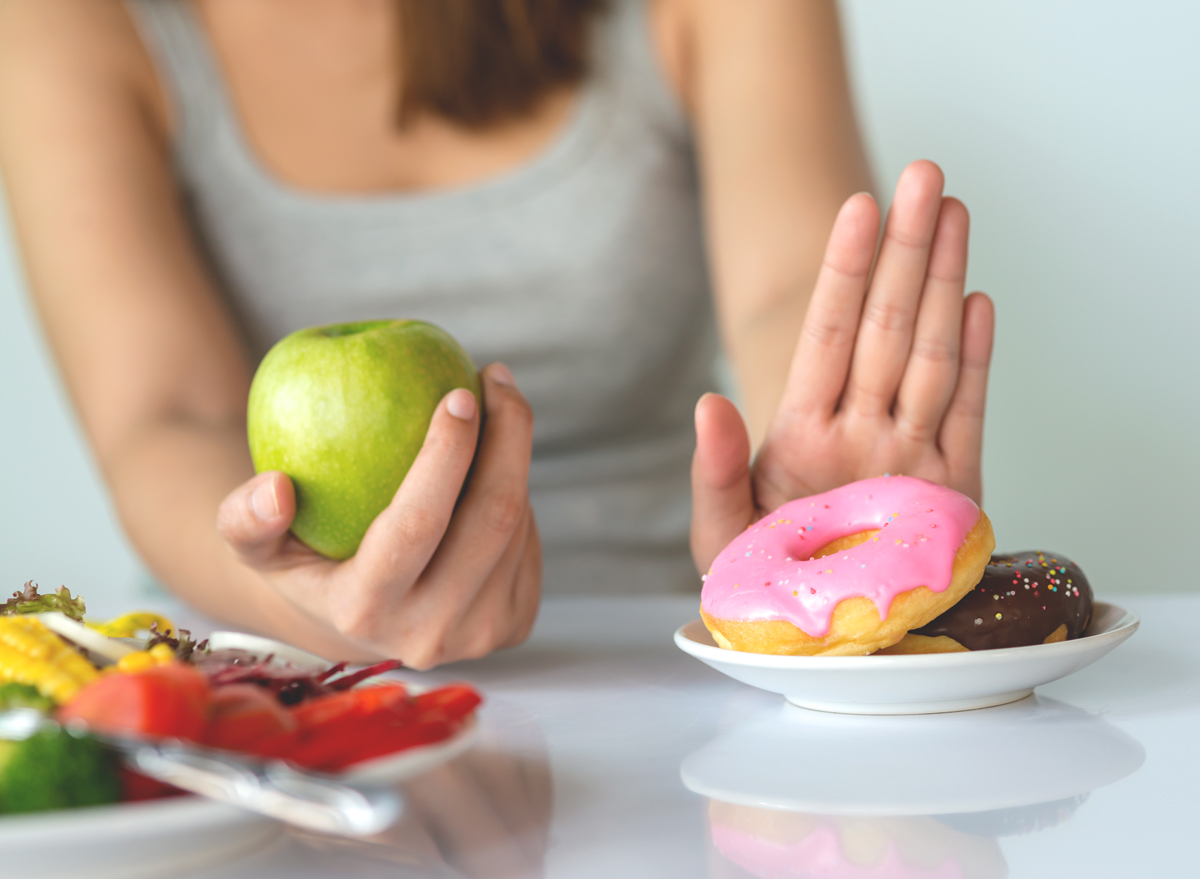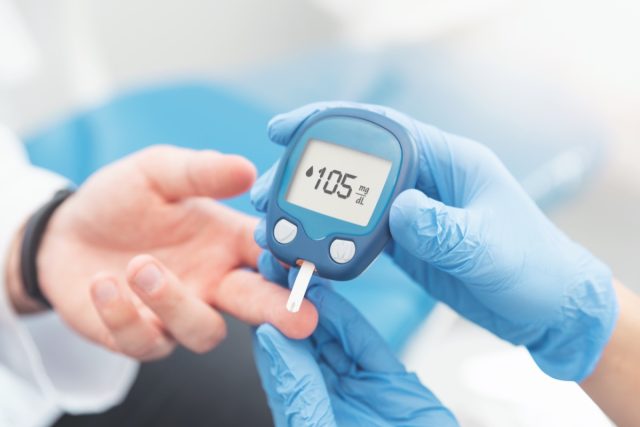What Happens to Your Body When You Cut Out Sugar

The average American consumes 17 teaspoons of sugar a day, but the Dietary Guidelines for Americans 2020–2025 recommends that
Americans keep their intake of added sugars to less than 12 teaspoons. Eating too much sugar is associated with many of the leading causes of death in the U.S., including heart disease, certain cancers, and type 2 diabetes, among others. But the key phrase here is "too much." Sugar can be a part of a healthy, balanced diet—after all, our brain's primary source of fuel is glucose (aka sugar). The health issues arise only when you eat more sugar than you need.
While it would be incredibly hard to eliminate all sugar from your diet since all foods with carbs end up getting broken down into sugar by the body to use as energy, it's smart to focus on reducing your intake of added sugars. Remember, added sugars are those not naturally found in whole foods, such as fruits and vegetables.
"If you consume a high-sugar diet, I would recommend reducing sugar intake gradually rather than eliminating it suddenly to avoid the desire just to stop because withdrawal symptoms are unpleasant," says Danielle Crumble Smith, RDN, LDN, a dietitian with Top Nutrition Coaching.
Some of the initial symptoms of sugar withdrawal include:
- Headaches
- Cravings
- Mood changes
- Fatigue
- Dizziness
- Poor concentration
If you want to go cold turkey on sugar, just be mindful of potential symptoms and don't let that deter your healthy habit changes.
"Ensuring a balanced diet (with adequate protein, healthy fats, and fiber) as well as staying well-hydrated and exercising regularly can help stabilize blood sugar levels and reduce [sugar] withdrawal symptoms," Smith says.
Once you get over that hump, here's what can happen to your body when you cut out sugar.
Your Blood Sugar and Metabolic Health Will Improve

For starters, consuming a lot of sugar too often causes your blood sugar to spike, which triggers the pancreas to release insulin. Insulin is a hormone that helps bring your blood glucose down to a normal range. Now you're probably thinking, OK, well if my body knows how to handle the extra sugar by making insulin, then there's no cause for concern, right?
Not quite. Chronic high sugar intake causes your body to release a lot of insulin, which can lead to insulin resistance—a condition where cells don't respond well to the insulin and, as the name suggests, become resistant to it. Insulin resistance significantly increases your risk of type 2 diabetes, Smith says.
"By eliminating sugar, your insulin levels become more stable, reducing the risk of developing insulin resistance and aiding in overall metabolic health," Smith says.
Your Mood May Get Worse Before It Gets Better

When you first cut sugar out of your diet, you'll probably feel irritable and cranky. "While the initial 'sugar high' can lead to a temporary mood boost, the subsequent drop in blood sugar can lead to a mood crash, potentially increasing feelings of anxiety," Smith says.
Not only does sugar mess with your blood glucose, but it can also tinker with your brain chemicals. "Sugar consumption can impact dopamine levels, a neurotransmitter associated with pleasure and reward," Smith says. "And reducing sugar intake can temporarily disrupt this balance."
Therefore, eliminating sugar could potentially lead to withdrawal symptoms, such as irritability, anxiety, or mood swings. If you're planning to cut out sugar, "Warn friends ahead of time and plan fun outings and/or get outside to do things that naturally boost dopamine," Smith suggests.
But there's a light at the end of the tunnel: Once you get over the withdrawals, you'll likely notice a sunnier mood.
Sugar has an especially significant effect on the gut and brain, which both influence the way you feel. "The gut-brain axis is a communication network that links the emotional and cognitive centers of the brain with peripheral intestinal functions. Excessive sugar can disrupt gut health, and an imbalanced gut microbiota has been associated with feelings of depression," Smith says.
The final word: More stable blood sugar levels and a healthier gut translate to a more stable mood.
You'll Lower Your Risk of Heart Disease

Heart disease is the number one cause of premature death in the U.S., according to the CDC. And consuming more than 20% of your total calories from added sugars has been associated with heart disease, says Annette Snyder, MS, RD, CSOWM, LD, a dietitian with Top Nutrition Coaching.
"Along with cholesterol, your body makes a substance called triglyceride, which is like a 'fluffy' blood fat that can lead to blockages and a host of other related problems," Snyder says.
Triglycerides are a storage form of excess sugar, and so cutting out sugar can reduce your triglyceride levels can help keep your ticker in good shape.
You Might Lose Weight

It's a given that cutting out your daily morning muffin and post-dinner slice of tiramisu can help you lose weight.
"Sugary foods and drinks are high in calories but low in nutritional value, and they're easy to over-consume due to their low fiber content," Smith says. What's more, "added sugars in beverages are not as satisfying as a meal, so it doesn't necessarily 'register' as a meal," Snyder says.
Cutting sugar from your diet naturally decreases your overall caloric intake — and eating fewer calories can potentially lead to weight loss. "Eliminating a daily soda habit can result in weight loss of ½-1 lb per week," Snyder says.
The perks are not only skin-deep — the benefits go beyond surface level: "A diet low in sugar can be particularly effective in reducing visceral fat, a type of fat associated with higher risks of heart disease, diabetes, and certain cancers," Smith tells us.
Frequent sugar consumption can also trigger a cycle of high and low blood sugar levels, which can lead to cravings for more sugar. "By cutting down sugar, you stabilize blood sugar levels, which naturally helps reduce cravings and makes it easier to adhere to a balanced diet," Smith says.
"Over time, reducing sugar can decrease the body's dependence on sugar for energy, aiding in long-term dietary stability." And so by cutting out sugar, you'll have more room in your diet for more nourishing nutrients from whole foods, which can also help you achieve and maintain a healthy weight.
You'll Decrease Your Inflammation Levels

Despite all the flashy headlines you've read about this buzzword, not all inflammation is bad. It's the chronic (aka long-term) inflammation that can wreak havoc on your health.
Eating too much sugar too frequently has been linked to increased levels of inflammation throughout the body, which can contribute to the development of chronic diseases such as heart disease, arthritis, and even certain cancers, Smith says.
Lowering your sugar intake can reduce your risk of chronic inflammation levels, potentially decreasing the risk of these chronic conditions, Smith says.
You'll Energy Will Take a Hit… At First

When you first cut out the sweet stuff, it's common to feel tired or lethargic, as the body initially may struggle to create energy without its daily dose of sugar. What's more, "high sugar intake often leads to rapid increases in energy (sugar highs) followed by steep declines (sugar crashes)," Smith says. So by eliminating sugar, you can maintain more stable blood glucose levels.
"With stable blood sugar levels, the body experiences fewer energy highs and crashes, leading to more consistent energy levels throughout the day," Smith says.
Pro tip: Focusing on consistent, balanced meals, and drinking enough water throughout the day can help you get over that withdrawal hump.
Your Skin May Look Brighter

Sugar is inflammatory, which can exacerbate skin conditions like acne. A high-glycemic diet (one that causes high blood sugar) has been significantly associated with acne in multiple studies, according to a 2022 systematic review in JAAD International.
Sugar can not only manifest itself as acne but can also cause your skin to age faster. "Sugar can also contribute to skin aging due to the process of glycation, where sugar molecules attach to proteins in the skin, leading to loss of elasticity and wrinkles," Smith says.
"Reducing sugar intake can improve skin clarity and slow down aging processes related to inflammation and glycation," Smith says.
Your Gut Health and Immunity Might Improve

Your gut doesn't like sugar. A high-sugar diet can lead to an imbalance in gut bacteria, favoring the growth of pathogenic bacteria and yeasts like Candida, Smith says.
"The bacteria in our gut protect our digestive tract and serve as the first line of defense against invaders," Snyder says. "When the gut's barrier is affected, the lining is easier for undesirable microorganisms to cross — and this essentially means you could get sick more often."
What's more, this imbalance can disrupt digestion and absorption, leading to various digestive issues, per a 2022 study in Clinical Gastroenterology and Hepatology. "By reducing sugar intake, you promote a healthier balance of gut microbiota, which is essential for effective digestion, nutrient absorption, immune function, and overall health," Smith says.
You Might Sleep Better

There's a reason why your parents forbade you from eating sweets before bedtime. "Sugar intake can affect the production and regulation of hormones like serotonin and melatonin, which play key roles in sleep regulation," Smith says.
In a 2016 study in the Journal of Clinical Sleep Medicine, researchers found that folks who ate a high-sugar diet experienced restless, less restorative sleep. "Consuming a lot of sugar can increase the likelihood of nocturnal awakenings. The body's effort to stabilize blood sugar levels during sleep can disrupt the sleep cycle and lead to nocturnal awakenings," Smith says.
If you find yourself having trouble catching zzzs, it might be time to take a look at your sugar intake and pare down. "Lower sugar consumption can improve the quality of sleep, leading to more restful and restorative sleep, and can help normalize the production of sleep-regulating hormones, thereby aiding in the regulation of healthy sleep cycles," Smith says.
You'll Enjoy Better Oral Health

Cutting out sugar is just what the dentist ordered. "There are bacteria in your mouth, and when they come into contact with sugar, they produce an acid that can eat away at your tooth enamel," Snyder tells us. Not only does this increase the risk of cavities, but it also raises the risk of developing gum disease.
"Consuming added sugars all day from sweetened beverages is especially harmful, as you are constantly bathing those bacteria with their preferred food source," Snyder says.
Cutting out sugar can therefore significantly lower your risk of cavities and gum disease, contributing to better oral health overall.
- Source: https://www.dietaryguidelines.gov/sites/default/files/2020-12/Dietary_Guidelines_for_Americans_2020-2025.pdf#page=31
- Source: Meixiong, J., Ricco, C., Vasavda, C., & Ho, B. K. (2022). Diet and acne: A systematic review. JAAD international, 7, 95–112. https://doi.org/10.1016/j.jdin.2022.02.012
- Source: Arnone, D., Chabot, C., Heba, A. C., Kökten, T., Caron, B., Hansmannel, F., Dreumont, N., Ananthakrishnan, A. N., Quilliot, D., & Peyrin-Biroulet, L. (2022). Sugars and Gastrointestinal Health. Clinical gastroenterology and hepatology : the official clinical practice journal of the American Gastroenterological Association, 20(9), 1912–1924.e7. https://doi.org/10.1016/j.cgh.2021.12.011
- Source: St-Onge, M. P., Roberts, A., Shechter, A., & Choudhury, A. R. (2016). Fiber and Saturated Fat Are Associated with Sleep Arousals and Slow Wave Sleep. Journal of clinical sleep medicine : JCSM : official publication of the American Academy of Sleep Medicine, 12(1), 19–24. https://doi.org/10.5664/jcsm.5384









